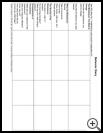
Hurting Another Child
What is aggressive behavior?
Children experiment with aggressive behaviors such as hitting, slapping, pinching, scratching, poking, hair-pulling, biting, kicking, shoving, and knocking down. Because hurting other people is unacceptable in the adult world and potentially harmful, do not allow children to behave this way.
What is the cause?
Many children fight when they are angry. They do not like something another child did and they retaliate. Or they may want something another child has and see force as the easiest way to get it.
Most children try aggressive behaviors because they see other children or people on TV behave this way. If children get what they want by hitting, this behavior will become more frequent.
Occasionally children become excessively aggressive because they receive lots of spankings at home or witness spouse or sibling abuse.
How can I help my child?
- Establish a rule.
"Do not hit because it hurts. We do not hurt people."
- When your child behaves aggressively, give him a brief time-out in a boring place.
When it looks as if your child might hurt someone, intervene immediately. Stop the behavior at the early threatening or shoving stage. Do not wait until the victim is hurt or screaming. Giving your child a time-out helps him learn to calm down rather than explode when he is angry.
If the time-out is not effective, also take away your child's favorite toy or television time for the remainder of the day.
- Suggest acceptable ways to express anger.
You want your child to learn to talk about his anger in a calm but assertive way. Encourage your child to come to you when he is angry and talk about it until he feels better. A second option is to teach your child to stop and count to 10 before doing anything about his anger. A third option is help him learn to walk away from a bad situation. Giving your child a time-out is one way of teaching him to walk away from anger. Teaching your child how to control anger provides him with a valuable resource.
Children younger than 3 or 4 years old often do not know how to express their feelings with words. They need time to develop language skills. When they are in time-out, don't be surprised if they pout, mutter to themselves, yell in their room, or pound on their door. If they are not allowed to express their anger in these ways, a more aggressive outburst may occur. As long as the behavior is not destructive, ignore it.
- Verbalize your child's feelings for him.
If your child has trouble talking about his anger, put it into words for him: "I know that you feel angry." It is unrealistic to expect your child not to feel anger. You may need to make an understanding statement such as, "You wish you could punch your brother, but we cannot hurt other people."
- Teach your child acceptable ways to get what he wants.
Teach your child to ask for what he wants rather than take it. Teach him how to take turns or how to trade one of his toys to gain use of another child's toy.
- Give special attention to the victim.
When children start fighting try to rescue the victim before he is hurt. While the child who was aggressive is in time-out, pick up the child who has been injured and give him sympathy and attention. The child in time-out will wish for your attention. Your attention to the victim instead should prompt the aggressive child to think more about the situation.
If fighting is a pattern with certain playmates or siblings, make sure that the child who appears to be the victim isn't actually getting the other child into trouble to gain attention.
- Never hit your child for hitting someone else.
Hitting your child teaches that it is fine to hit if you are bigger. If your child tends to be aggressive, you must eliminate all physical punishment such as spanking. You can use many other consequences such as time-out to teach your child right from wrong.
- Praise your child for friendly behavior.
Praise your child for being nice to people, playing with others in a friendly way, sharing things, and helping other children. Remind your child that people like to be treated kindly, not hurtfully. Some children respond to a system of receiving a treat or a star on a star chart for each day they do not behave aggressively.
How can I help prevent this problem?
Set a good example. Show self-control and how you solve problems by talking about them. Avoid playmates who often tease or other situations in which your child frequently fights. When your child becomes tired or hungry, he should leave the area of play until these needs are met.
When should I call my child's healthcare provider?
Call during office hours if:
- The aggressive behavior is very frequent.
- Your child has seriously hurt another child.
- Your child can't keep friends.
- Your child seems very angry.
- The misbehavior continues more than 4 weeks after you start following these recommendations.
- You have other questions or concerns.
Last modified: 2001-12-18
Last reviewed: 2016-06-01

